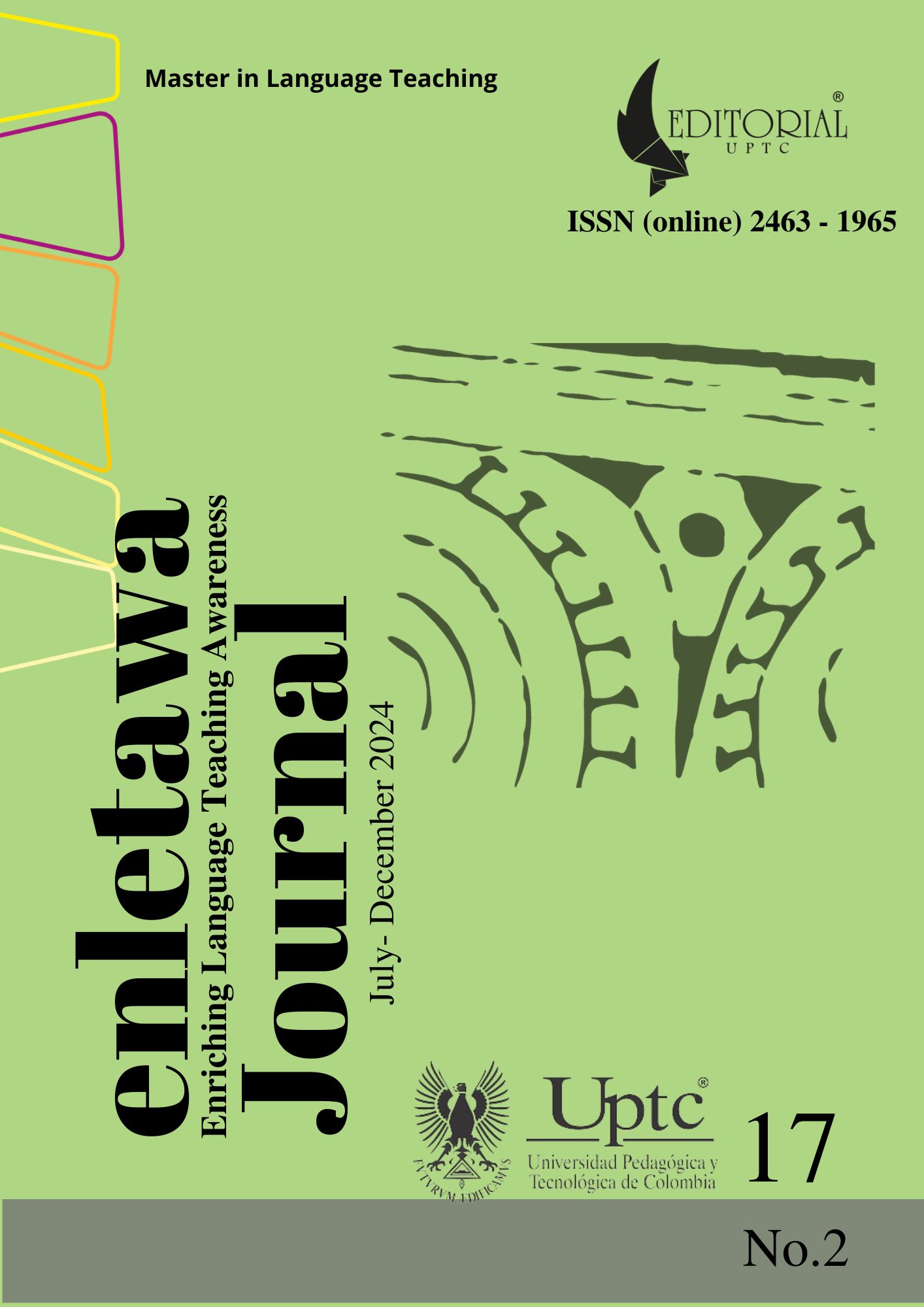Immersion Programs: Beyond Language Learning

Abstract
This research article is the result of a Project developed in a private school in Tunja, Colombia. It aimed at describing the perceptions of a group of graduates, students, and their parents about an immersion program, after having participated in one of them. Four surveys were applied to four different groups of participants: parents, graduates, students who traveled in 2018 and students who participated in the immersion program in 2019. After conducting the corresponding analysis, following the thematic approach, the perceptions presented by the participants were grouped into the following categories: Immersion programs: beyond learning a language; Knowing me and growing as a person, and My experience as a base to strengthen the program and my own school. It was possible to conclude that he immersion program had academic and social effects on the participants. It can be seen as a resource for learning, practicing, and reinforcing a foreign language as well as learning about other cultures.
Keywords
language immersion programs, language and culture, academic achievement, language proficiency, cultural identity, program evaluation
References
- Aguirre Morales, Jahir, Bertha Ramos Holguín, e Ilba Rodríguez Tamayo. Addressing the Basics of EFL Classrooms: Key Elements for Pre-Service Teachers. Editorial UPTC, 2024. http://dx.doi.org/10.19053/uptc.9789586608244 DOI: https://doi.org/10.19053/uptc.9789586608244
- Alcaldía de Tunja. Plan de Desarrollo de Tunja. Tunja la capital que nos une. 2020. https://alcaldiatunja.micolombiadigital.gov.co/sites/alcaldiatunja/content/files/000802/40091_pdm-_tunja_la_capital_que_nos_une_20202023.pdf
- Endang, Sri Andayani. “The Importance of Learning and Knowing English in Higher Education in Indonesia.” Research and Development Journal of Education, vol. 8, no. 1, 2022, pp. 372-379. http://dx.doi.org/10.30998/rdje.v8i1.13315 DOI: https://doi.org/10.1155/2022/3699260
- Baydak, Alexandra V., Claudia Scharioth, and Irina A. Il’vashenko. “Interaction of Language and Culture in the Process of International Education.” Procedia, Social and Behavioral Sciences, vol. 215, 2015, pp. 14-18. https://doi.org/10.1016/j.sbspro.2015.11.567 DOI: https://doi.org/10.1016/j.sbspro.2015.11.567
- Chan, Wai Meng, and Sasiwimol Klayklueng. “Critical Cultural Awareness and Identity Development: Insights from a Short-term Thai Language Immersion.” Electronic Journal of Foreign Language Teaching, vol. 15, 2018, pp. 129–147. doi.10.56040/amck1521 DOI: https://doi.org/10.56040/amck1521
- Cobo, Giselle, Lizeth Ramos Acosta, y Heriberto González Valencia. “Políticas públicas sobre bilingüismo en Colombia y la formación de docentes de lenguas extranjeras.” En La formación del profesorado. Teoría y práctica pedagógica, editado por M. C. Cano Quintero, pp. 25-42. Editorial Universidad Santiago de Cali, 2020.
- Cronquist, Kathryn, and Ariel Fiszbein. “El aprendizaje del inglés en América Latina.” Fundación Lúminis, Biblioteca Virtual, 2017. https://www.fundacionluminis.org.ar/editorial/el-dialogo-liderazgo-para-las-americas
- Di Silvio, Francesca, Anne Donovan, and Margaret E. Malone. “The Effect of Study Abroad Homestay Placements: Participant Perspectives and Oral Proficiency Gains.” Foreign Language Annals, vol. 47, 2014, pp. 168-188. https://doi.org/10.1111/flan.12064 DOI: https://doi.org/10.1111/flan.12064
- “English Proficiency Index.” EF, 2023. Reports.https://www.ef.com/assetscdn/WIBIwq6RdJvcD9bc8RMd/cefcom-epi-site/reports/2023/ef-epi-2023-english.pdf
- Genesee, Fred, William E Lambert y Naomi E. Holobow (1986). “La adquisición de una segunda lengua mediante inmersión: el enfoque Canadiense.” Infancia y Aprendizaje, Vol. 33, 1986, pp. 27-36. DOI: https://doi.org/10.1080/02103702.1986.10822103
- Gobernación de Boyacá. “Índice Departamental de Competitividad.” Consejo Privado de Competitividad, 2023. https://cctunja.org.co/boyacacompite/indice-departamental-de-competitividad-2023/#:~:text=El%20IDC%202023%20eval%C3%BAa%20la,mercados%20y%20iv)%20ecosistema%20innovador.
- Infobae. “Prueba Saber 11 2023: matemáticas e inglés, las materias con puntajes más bajos.” Infobae, 14 nov. 2023. https://www.infobae.com/colombia/2023/11/14/prueba-saber-11-2023-matematicas-e-ingles-las-materias-con-puntajes-mas-bajos/
- Ministerio de Educación Nacional. “Estándares Básicos de Competencias en Lengua Extranjera: Inglés.” Santillana, 2006. https://santillanaplus.com.co/pdf/estandares-basicos-de-competencias.pdf
- Ministerio de Educación Nacional. “Programa Nacional de Inglés: Colombia Very Well.” Ministerio de Educación Nacional, 2014. https://www.mineducacion.gov.co/1759/articles-343837_Programa_Nacional_Ingles.pdf
- Ministerio de Educación Nacional. “Derechos Básicos de Aprendizaje de Inglés.” Santillana, 2016. https://santillanaplus.com.co/pdf/DBA-ingles-espanol.pdf
- Ministerio de Educación Nacional. “Colombia Bilingüe: Conozca el programa.” Santillana, 2016. https://rutamaestra.santillana.com.co/programa-colombia-bilingue-2014-2018/
- Moneypenny, Dianne Burke y Rosalie S Aldrich. “Study Abroad and Intensive Linguistic Immersion in Spain: Undergraduate Oral Proficiency for Short-Term Study Abroad.” Frontiers: The Interdisciplinary Journal of Study Abroad, vol. 36, no 1, 2024, pp. 640–659. https://doi.org/10.36366/frontiers.v36i1.781 DOI: https://doi.org/10.36366/frontiers.v36i1.781
- Muhammad, Naeem, Wilson Ozuem, Kerry Howell, and Silvia Ranfagni. “A Step-by-Step Process of Thematic Analysis to Develop a Conceptual Model in Qualitative Research.” International Journal of Qualitative Methods, vol. 22, 2023. https://doi.org/10.1177/16094069231205789 DOI: https://doi.org/10.1177/16094069231205789
- Nes, Anders, Kristoffer Sundberg, and Sebastian Waltzl. “The Perception/Cognition Distinction.” Inquiry, vol. 66, no. 2, 2021, pp. 166-195. https://doi.org/10.1080/0020174X.2021.1926317 DOI: https://doi.org/10.1080/0020174X.2021.1926317
- Nishanthi, Rajathurai. “The Importance of Learning English in Today World.” International Journal of Trend in Scientific Research and Development, vol. 3, no. 1, 2018, pp. 871-874. http://dx.doi.org/10.31142/ijtsrd19061 DOI: https://doi.org/10.31142/ijtsrd19061
- Nur, Yunidar, Muhammad Yunus and Ulinsa Ulinsa. “Psychological Aspects of Second Language Acquisition: A Case Study Indonesian Educational System.” Euromentor, vol. 14, no. 1, 2023, pp. 50–73. https://www.proquest.com/docview/2799231138?sourcetype=Scholarly%20Journals
- Onosu Gloria. “The Impact of Cultural Immersion Experience on Identity Transformation Process.” International Journal of Environmental Research and Public Health, vol. 18, no. 5, 2021, p. 2680. https://doi.org/10.3390/ijerph18052680 DOI: https://doi.org/10.3390/ijerph18052680
- Oviedo, Gilberto. Leonardo. “La definición del concepto de percepción en psicología con base en la teoría Gestalt.” Revista de Estudios Sociales, vol. 1, no.18, 2024, pp.89-96. https://doi.org/10.7440/res18.2004.08 DOI: https://doi.org/10.7440/res18.2004.08
- Prasad, Nadipuram Ram. “Perception and Reality”. In Statistical and Fuzzy Approaches to Data Processing, with Applications to Econometrics and Other Areas, edited by V. Kreinovich, pp.193-2018. Springer, 2020. https://doi.org/10.1007/978-3-030-45619-1_15 DOI: https://doi.org/10.1007/978-3-030-45619-1_15
- Taherdoost, Hamed. “Data Collection Methods and Tools for Research; A Step-by-Step Guide to Choose Data Collection Technique for Academic and Business Research Projects.” International Journal of Academic Research in Management, vol. 10 no. 1, 2021, pp. 10-38. https://hal.science/hal-03741834v1/file/Data%20Collection%20Methods%20and%20Tools%20for%20Research%20.pdf
- Ugwu, Chinyere. N. and Eze Val, H. U. “Qualitative Research”. IDOSR Journal of Computer and Applied Sciences, vol. 8, no. 1, 2023, pp. 20-35. https://www.researchgate.net/publication/367221023_Qualitative_Research#fullTextFileContent
- Williams, Tara.Chinese Language Learning in the Early Grades: A Handbook of Resources and Best Practices for Mandarin Immersion. Asia Society, 2012 https://asiasociety.org/files/chinese-earlylanguage.pdf
